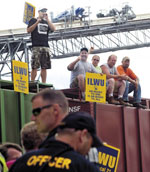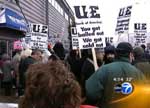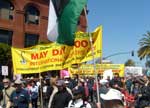
Showdown on West Coast Docks: The Battle of Longview
(November 2011).
click on photo for article

Chicago Plant Occupation Electrifies Labor
(December 2008).
click on photo for article

May Day Strike Against the War Shuts
Down
U.S. West Coast Ports
(May 2008)
click on photo for article

January 2017
You Can’t
Fight Trump with Democrats –
For a Class-Struggle Workers Party!
NYC Transit Workers: Fight
for
Track Safety and Free Mass Transit!

NYC transit workers rally outside MTA headquarters, November 15. TWU must break with the Democrats and build a revolutionary workers party to win. (Rose Abuin/Daily News)
As we go to press, on January 16, NYC transit union president John Samuelsen announced a tentative contract with “solid raises ... well ahead of inflation.” The TWU website boasted of a “concession-free” contract. Many members will be rightly skeptical.
D-Day is January 15. That’s when the contract for New York City subway and bus workers in Transport Workers Union Local 100 expires. The Metropolitan Transit Authority bosses are sure to raise a carload of giveback demands. At a mass rally last November 15, Local 100 president John Samuelsen vowed, “If we don’t come to work, this city can’t move.” In 2012-2014 transit workers went for two years without a contract. Instead of hinting, Local 100, the powerhouse of NYC labor, should draw the line: No contract – no work! And to make it stick, the TWU must begin gearing up for battle now.
A mass membership meeting is called for January 7. For starters, a strike committee should be elected. Picket schedules should be drawn up, demonstrations begun. Have thousands of transit workers tie up traffic on the Brooklyn Bridge and then jam Wall Street. Raise demands to win the support of riders and all NYC labor. Not only should the union oppose a fare hike, it should revive the TWU’s historic call for free mass transit. And with workers being killed on the tracks and injured at an alarming rate, Local 100 should make track safety a top demand.
If the union raised such demands, NYC working people would overwhelmingly and enthusiastically back transit workers in their contract fight. Remember that in 2005, when the big business press was calling transit strikers “rats” and demanding union leaders be jailed, a solid majority of city residents continued to support the strike. But to make that support count, the entire NYC labor movement must come out. Transit workers must not stand alone!
Safety First
At the November rally, Samuelsen talked a lot about safety. There was a moment of silence for workers who died on the job. Two weeks earlier, track worker Louis Gray was pinned and killed by a G train while setting up lights to warn train operators of track work ahead. His partner, Jeffrey Fleming, was also struck and suffered serious injuries. In October, signal maintainer Monique Braithwaite fell onto the third rail while on the job. Nerve damage was so bad that her right arm had to be amputated: a catastrophe for anyone, let alone a single mother raising four children.
Samuelsen said that every day an average of five transport workers are injured badly enough that they have to miss work. So where are the union’s safety demands? None of the announced contract demands relate to worker safety on the tracks. Louis Grey died because he and Jeffrey Fleming did not have enough time to get into separate cubbyholes. They had no warning that there was an oncoming train about to round the corner, and the operator had no idea they were there. Bloc signals prevent a train from entering a bloc occupied by another train, but do nothing to protect flaggers. CBTC signals only increase the risk by letting trains operate closer together.
There is no reason workers have to die on the tracks. Technology that can greatly increase track worker safety already exists. The Canadian rail equipment manufacturer Bombardier, which delivered the latest (R-179) train to the MTA in September for testing, has developed a system called Tracksafe that would virtually eliminate all such incidents. Workers walking along the tracks have an RFID chip embedded in their badge which notifies the system of their presence. Sensors detect where trains are, so that when they are a certain distance away workers are alerted by a siren and flashing strobe lights. Tracksafe has been tested on Atlanta’s transit system, MARTA. But management consistently undercuts safety in the name of “efficiency.”
In response to Louis Grey’s death, Samuelsen said “the NYC Transit Authority can’t protect us so they damn well better pay us.” Yes, the MTA damn well better pay … and it damn well should be forced to ensure worker safety! The union should demand worker safety committees with the power to shut down the system for unsafe working conditions and that the MTA install track safety technology to ensure no track worker would die on the job again!
Rip Out the Turnstiles and Refuse to Pay Wall Street
Currently the TWU leadership is demanding raises above 2%. This is only slightly over inflation. The MTA typically juggles its books to produce a deficit so it can cry poverty at contract time, but this time it admits to having a surplus. The demand for a full cost-of-living adjustment (COLA) should be non-negotiable, along with a big raise on top of that.
Transit bosses say they need the money to pay off debt due to the capital program, so they can build a Second Avenue subway which stops short of Harlem, and the 7 train extension to the Javits Convention Center and the new Hudson Yards high-end office and residential district. In short, the MTA board runs the system in the interest of capital.
The capitalists only need mass transit to take its wage slaves to and from work. That is a key reason why service on Saturday and Sunday is so lousy. Local 100 should demand a doubling of train service on the weekends. Meanwhile, fares take a huge bite out of everyone’s pay. In 2015, police arrested almost 30,000 people for fare beating, the vast majority of them African American and Latino. But if there were no fare to beat, there wouldn’t be any “evasion” arrests to make. We say rip out the turnstiles and make public transit free!
A main reason fares keep going up is because the MTA is paying off a massive debt to Wall Street bankers. As of 2015, the debt amounted to a whopping $34 billion. That’s bigger than the national debt of 30 countries. The debt is decades old. In the mid-1970s, NYC was placed under the control of a Municipal Assistance Corporation, headed by investment banker Felix Rohatyn, and an Emergency Financial Control Board. The EFCB stopped infrastructure maintenance on bridges, tunnels and of course the public transit system. In 1981 the MTA was allowed to issue bonds to raise money for repairing its infrastructure, and has been borrowing ever since.
The capitalists who started this mess are the ones profiting from it. When New York was first subjected to the dictatorship of the EFCB, it was because the banks junked the city’s credit rating and drove it to near bankruptcy. Republican president Gerald Ford famously told the city to “drop dead” and said he would veto any bailout. But it was Democratic Party NYC officials who carried out Wall Street’s diktat. The banks raided the city – and they’re still collecting today. Local 100 should call to open MTA books to union inspection, and to stop paying the debt..
Shred the Taylor Law – Break with the Democrats – Build a Workers Party!
In order to win, the union has to go up against New York’s no-strike Taylor Law. But the union leadership plays by the bosses’ rules. In 2005, Local 100 president Roger Toussaint didn’t want the strike. When the membership voted to walk out, he called off the strike on the third day. The union was hit with a $2.5 million fine and removal of the dues checkoff, while members were fined two days’ pay for each day of the strike. Despite his services to the ruling class, Toussaint was jailed anyway. Toussaint came to office together with the New Directions caucus. These “reformers” crossed the class line by suing the union in the bosses’ courts. Once they got into office, the government owned them – no wonder they collapsed.
Now Samuelsen is calling the shots after being elected in 2009 on the Take Back Our Union slate. At the November 15 rally, he bragged about making the “smart decision to bargain past the end of the contract,” citing “an economic crisis that was very real.” The result was a contract with all kinds of givebacks – increased healthcare contributions, an additional two years for new hires to reach top pay, and pay “raises” below the rate of inflation. Since last year, Samuelsen sits on the MTA Board thanks to Governor Cuomo, no doubt as a reward for playing ball by working without a contract. If a strike is in the offing, you can bet he won’t defy Cuomo.
Union workers are under the gun across the country. But in order to bust the union-busters, labor must throw the ties that bind it to the Democratic Party. In Philadelphia, TWU transit workers struck at the beginning of November, but settled on the eve of the November 8 election to avoid embarrassing Hillary Clinton (see “Victory to the SEPTA Strike! Mobilize All of Philly Labor to Win!” (The Internationalist, 5 November 2016). In July 2013, Bay Area Rapid Transit workers walked out in a strike that was 100% effective. But after four days, the Amalgamated Transit Union tops called it off at the request of Democratic governor Jerry Brown (see “Lessons of the On-Again, Off-Again BART Strike,”The Internationalist, 10 November 2013).
Everywhere the biggest obstacle to a successful strike is the labor bureaucracy that is bound hand-and-foot to the Democrats. This is true both of the old-line bureaucrats and reformers: Samuelsen hangs with Cuomo, Toussaint hobnobbed with then New York senator Clinton. In last year’s presidential election, the TWU endorsed Clinton. Now they are facing mega-capitalist Donald Trump and rabidly anti-union Republicans who control Congress. In order to wage a successful fight against these labor haters, it is necessary to break with the Democrats and oust the bureaucratswho chain labor to this party of capital.
The way forward was shown last August by the International Union of Painters (IUPAT) Local 10 in Portland, Oregon which voted to “not support the Democrats, Republicans, or any bosses’ parties or politicians,” and instead to “call on the labor movement to break from the Democratic Party, and build a class-struggle workers party” (see “To Hell with the Bosses’ Parties – For a Class-Struggle Workers Party!”The Internationalist No. 45, September-October 2016). If TWU Local 100 were to take up and pass IUPAT Local 10’s motion, it would set off a firestorm in the labor movement locally and nationwide. It would show the bosses that the workers are getting ready for a knock-down, drag-out fight.
As we wrote on the eve of the 2005 NYC transit strike, a walkout would be met with the full might of the capitalist state.
“To defeat this threat, it is necessary to go beyond simple business unionism and place New York transit workers at the head of all working people, poor, oppressed minorities and immigrants facing relentless attacks by the ruling class…. If the Taylor Law is used against the TWU, all public employees unions should walk out.”
What’s needed is “a program to mobilize labor’s power. That means, no more capitalist politicians on labor platforms, and no more representatives of police or detectives’ ‘unions’ either. We say: cops out of the unions – they are the armed fist of the bosses. And that means getting the revenue and ‘property protection’ cops out of the TWU.” The next time police gun down an innocent person, we added, “unions should mobilize their power and the TWU should shut down mass transit against police terror” (“Shut Down NYC with an All-Out Transit Strike!” The Internationalist, 10 December 2005).
Today, the war on working people continues, as does the plague of racist police terror. Now more than ever, it is necessary to fight politically, putting labor squarely in the forefront of the struggles of the oppressed. This is what a class-struggle workers party would do, and NYC transit workers have the power to wage that fight. What’s needed is to forge a leadership with the determination and revolutionary program to fight to win. ■